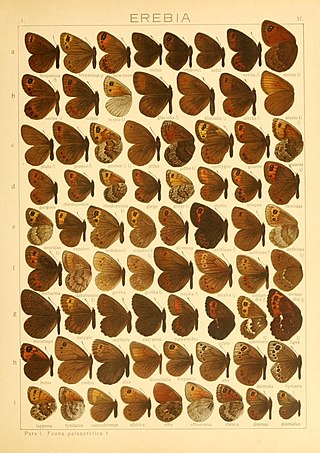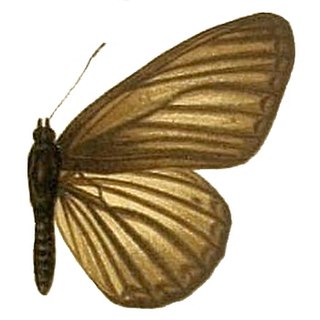
Apatura iris, the purple emperor, is a Palearctic butterfly of the family Nymphalidae.

The map is a butterfly of the family Nymphalidae.

Parantica aglea, commonly known as the glassy tiger, is a butterfly found in the Indomalayan realm. The species is a member of the Danainae subfamily of the Nymphalidae family.

Luthrodes pandava also called the Plains Cupid or cycad blue, is a species of lycaenid butterfly found in South Asia, Myanmar, United Arab Emirates, Indochina, Peninsular Malaysia, Singapore, Taiwan, Java, Sumatra and the Philippines. They are among the few butterflies that breed on cycads, known for their leaves being toxic to most vertebrates.

Euploea mulciber, the striped blue crow, is a butterfly found in India and Southeast Asia that belongs to the crows and tigers, that is, the danaid group of the brush-footed butterflies family.

Cethosia cyane, the leopard lacewing, is a species of heliconiine butterfly found from India to southern China, and Indochina. Its range has expanded in the last few decades, and its arrival in the southern part of the Malay Peninsula, including Singapore, is relatively recent.

Jamides celeno, the common cerulean, is a small butterfly found in Indomalayan realm belonging to the lycaenids or blues family. The species was first described by Pieter Cramer in 1775.

Apatura ilia, the lesser purple emperor, is a species of butterfly native to most of Europe and east across the Palearctic. It is named for its similarity to the purple emperor butterfly.

Melitaea diamina, the false heath fritillary, is a butterfly of the family Nymphalidae.

Cethosia nietneri, the Tamil lacewing, is a species of nymphalid butterfly found in Sri Lanka and south India. The species name is after John Nietner who obtained specimens of the butterfly from Ceylon from which it was described.

Lethe drypetis, the Tamil treebrown, is a species of Satyrinae butterfly found in south India and Sri Lanka.

The purple-edged copper is a butterfly of the family Lycaenidae.

Lopinga achine, the woodland brown, is a Palearctic butterfly in the family Nymphalidae.

Boloria dia, the Weaver's fritillary or violet fritillary, is a butterfly in the family Nymphalidae. The name Weaver's fritillary is in honor of Richard Weaver, an English insect collector who claimed to have obtained the specimen within ten miles of Birmingham around 1820. However, B. dia is very rare in England and the few specimens known from there are thought to be from possibly accidental introductions.

Polyommatus amandus, the Amanda's blue, is a butterfly of the family Lycaenidae. It is found in the Palearctic realm.
Lycaena violacea is a small butterfly found in the Palearctic that belongs to the lycaenids or blues family.

Euphydryas intermedia synonym ichnea is a small butterfly found in the Palearctic that belongs to the browns family. It occurs up to 2200 m above sea level.

Erebia dabanensis is a small butterfly found in the East Palearctic that belongs to the browns family.

Mimathyma schrenckii is a butterfly found in the East Palearctic that belongs to the Nymphalidae family.

Aldania raddei is a butterfly found in the East Palearctic that belongs to the browns family.



















